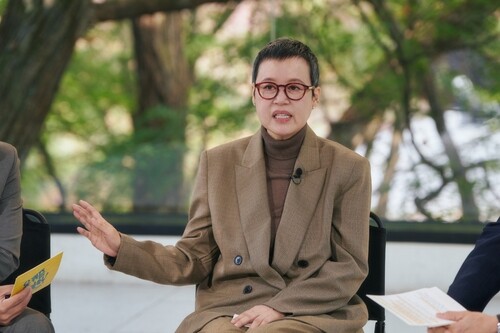UNSC-cybersecurity
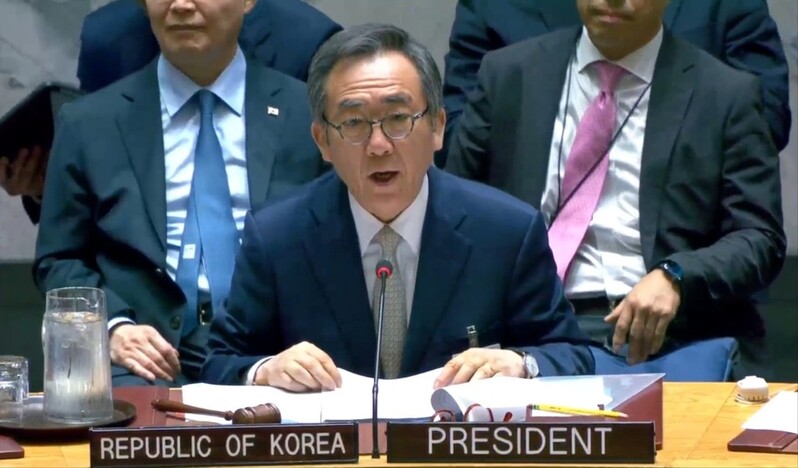 |
| ▲ South Korean Foreign Minister Cho Tae-yul presides over a U.N. Security Council meeting on cybersecurity at U.N. headquarters in New York on June 20, 2024 in this photo captured from U.N. Web TV. (PHOTO NOT FOR SALE) (Yonhap) |
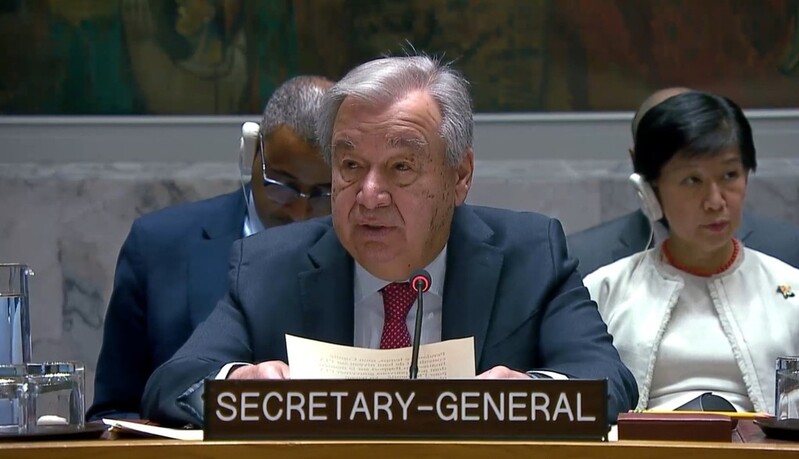 |
| ▲ U.N. Secretary General Antonio Guterres speaks during a U.N. Security Council meeting on cybersecurity at U.N. headquarters in New York on June 20, 2024 in this photo captured from U.N. Web TV. (PHOTO NOT FOR SALE) (Yonhap) |
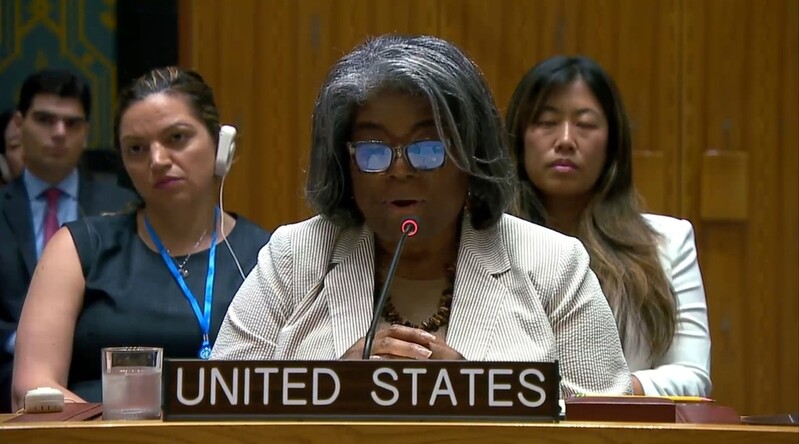 |
| ▲ U.S. Ambassador to the U.N. Linda Thomas-Greenfield speaks during a U.N. Security Council meeting on cybersecurity at U.N. headquarters in New York on June 20, 2024 in this photo captured from U.N. Web TV. (PHOTO NOT FOR SALE) (Yonhap) |
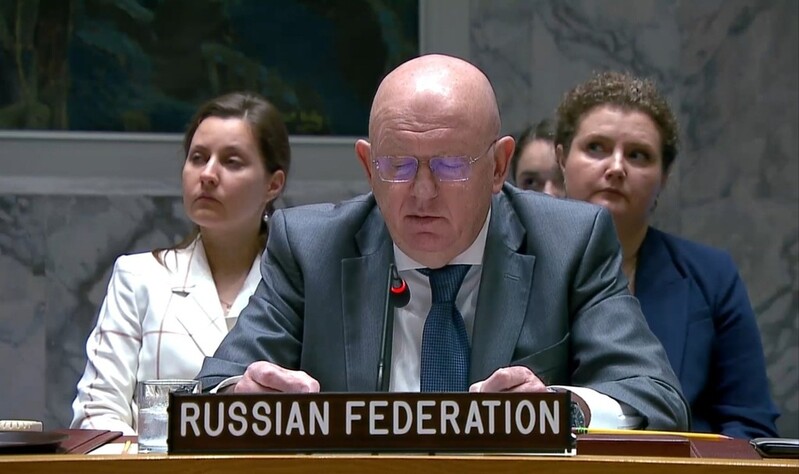 |
| ▲ Russian Ambassador to the U.N. Vasily Nebenzya speaks during a U.N. Security Council meeting on cybersecurity at U.N. headquarters in New York on June 20, 2024 in this photo captured from U.N. Web TV. (PHOTO NOT FOR SALE) (Yonhap) |
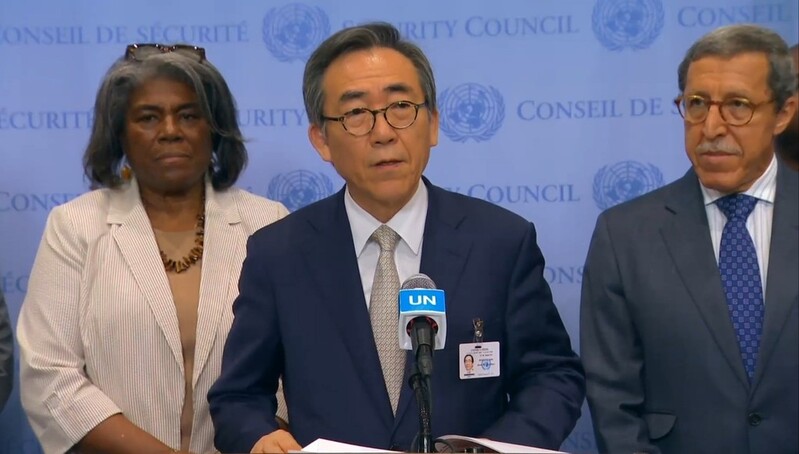 |
| ▲ South Korean Foreign Minister Cho Tae-yul speaks during a press conference at U.N. headquarters in New York on June 20, 2024 in this photo captured from U.N. Web TV. (PHOTO NOT FOR SALE) (Yonhap) |
UNSC-cybersecurity
FM Cho stresses need for UNSC to confront cybersecurity threats 'head-on' amid growing N.K. threats
By Song Sang-ho
WASHINGTON, June 20 (Yonhap) -- South Korean Foreign Minister Cho Tae-yul called Thursday for the U.N. Security Council (UNSC) to confront "real" and "present" cybersecurity threats "head-on," as he presided over a UNSC meeting as the council's rotating president.
The council convened an official meeting on cybersecurity, a topic that has taken on greater importance as Pyongyang is known to be reliant on malicious cyberactivities to evade sanctions and generate revenue to bankroll its nuclear and missile programs.
It marks the first official UNSC meeting on cybersecurity since the open UNSC debate on the subject in June 2021. In April, South Korea, the United States and Japan hosted an informal UNSC meeting on North Korea's evolving cyberthreats.
The UNSC has not dealt with cybersecurity as a mainstream topic despite its evolving and transnational nature, as China and Russia, two of the five veto-wielding UNSC members, are said to oppose UNSC discussions on the emerging issue at the council.
"The Security Council must not bury its head in the sand," Cho said in a statement delivered in his capacity as foreign minister. "At the very least, it must keep pace with trends outside the council and strengthen its engagement in response to the real and present threat from cyberspace."
He described threats from the cyber domain a "pressing" security challenge facing the world.
"The Security Council must confront cybersecurity head on if it is to remain relevant and agile in addressing one of the most pressing security challenges of our time," he said. "I sincerely hope today's open debate will generate momentum to make this happen."
Touching on the North Korean challenge, Cho said South Korea is "no stranger to the threats posed by malicious cyber activities."
"Through digital means, the DPRK systematically evades the various sanctions adopted by this council and challenges the international nonproliferation regime that is integral to the council's work at a time when peace and security in the physical world and cyber world are increasingly intertwined," he said.
DPRK stands for the North's official name, the Democratic People's Republic of Korea.
For the UNSC to tackle cyberthreats, Cho put forward a three-step approach consisting of a clear diagnosis of the present situation, prescription and an appropriate treatment.
"The borderless nature of cyberspace exposes all nations to the harms of malicious cyber activities whether digitally advanced or vulnerable," he said.
U.N. Secretary General Antonio Guterres pointed out that under the auspices of the U.N. General Assembly, member states are working to reach consensus on a new cybercrime treaty in the coming months.
"We should deepen cooperation while protecting human rights online but given the clear and growing links between cyberspace and global peace and security, this council can also play a key role by integrating cyber-related considerations into your existing work streams and resolutions," he said.
U.S. Ambassador to the U.N. Linda Thomas-Greenfield took note of North Korea's cyber operations that she said are used to fund its weapons of mass destruction and ballistic missile activities.
She also criticized Russia's cyberactivities.
"The Russian government has served as a safe haven for ransomware actors who in recent years have caused billions of dollars of losses and significant damages to hospitals and other critical infrastructure," she said.
Russian Ambassador to the U.N. Vasily Nebenzya expressed opposition to cybersecurity discussions at the council.
"Moving this topic to the Security Council platform automatically excludes all states who are not on the council from participating in decision making," he said.
He also enumerated various factors that make it difficult to deal with cybersecurity, such as the difficulty in identifying the source of a cyberattack.
"Any discussion of the Security Council could become yet another exchange of baseless accusations and lead to deepening divisions in the international community," he said.
Before the UNSC meeting, representatives of 63 countries and the delegation of the European Union issued a joint statement on the use of information and communications technology in the context of international peace and security.
"We note that the malicious use of cyberspace poses a significant challenge in today's interconnected world as states rely heavily on digital infrastructure for communication, commerce and governance," they said in the statement read out by Cho.
They also said that the linkage between cyberthreats and international peace and security is "evident."
"The Security Council has a key role to play in addressing cyber threats to fulfill its primary responsibility for maintenance of international peace and security," they said.
"We express our strong view that the Security Council needs to raise its awareness and deepen understanding of the ever evolving threat landscape in cyberspace."
(END)
<저작권자(c) 연합뉴스, 무단 전재-재배포, AI 학습 및 활용 금지>
(C) Yonhap News Agency. All Rights Reserved


























